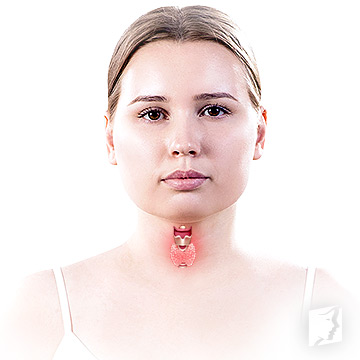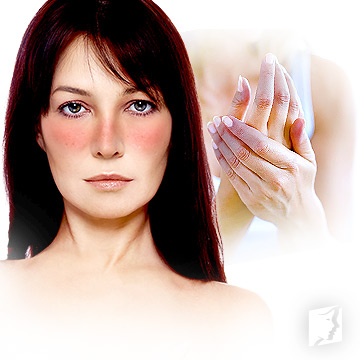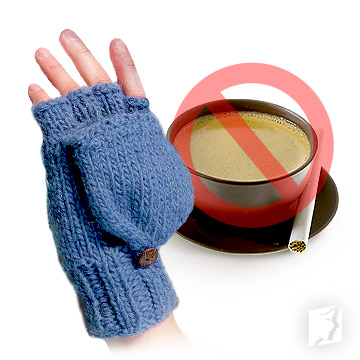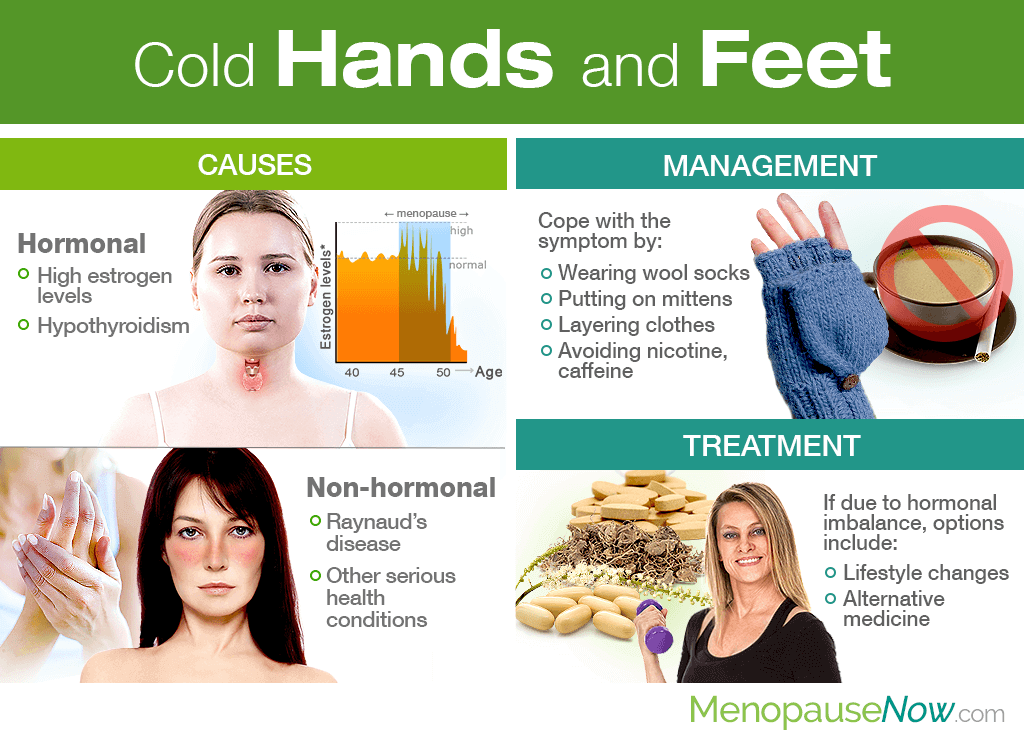Menopausal women who suffer from cold hands and feet year round, even in the heat of the summer, may wonder if this phenomenon is one to worry about or brush off as yet another one of the many menopause symptoms. Let us put your unease to rest.
Continue reading to learn all about cold hands and feet during menopause, including causes, management, treatment options, and more.
Cold Hands and Feet Causes
There are many reasons why hands and feet may always feel cold. They are broken into hormonal and non-hormonal causes below:
Hormonal causes

Perimenopause is a time characterized by drastic hormonal fluctuations as the ovaries wind down hormone production, principally of estrogen and progesterone.
High estrogen levels can cause increased levels of stress hormones that are created in the adrenal gland, called catecholamines. These stress hormones, in turn, constrict blood vessels, thus evoking cold hands and feet in menopausal women.
Yet, it is also possible that cold hands and feet during perimenopause are due to thyroid dysfunction, as it is common for many midlife women to develop an underactive thyroid gland (hypothyroidism).
Hypothyroidism can provoke symptoms of cold hands and feet among others, including fatigue, constipation, puffy face, muscle weakness, weight gain, dry skin, and more.
Non-hormonal causes

One of the most common non-hormonal causes of cold hands and feet is due to Raynaud's disease, a benign condition that causes blood vessels in the fingers and toes to overly constrict. This disease can also produce temporary color changes as arteries rewarm.
However, cold extremities can also be symptomatic of other serious health conditions, such as rheumatic conditions - like scleroderma, lupus, or rheumatoid arthritis - and peripheral artery disease (PAD).
When to Be Concerned
Having cold hands and feet should not generally be a need for concern.
Nonetheless, if your cold hands and feet are accompanied by symptoms of fever, weight changes, fatigue, joint pain, rashes, skin color changes, numbness, tingling, open sores, blisters, or tightened or hardened skin, seek advice from your providing healthcare professional quickly.
The aforementioned symptoms could indicate the presence of more severe, underlying rheumatic or vascular diseases.
Managing Cold Hands and Feet

Coping with the symptom can be done by:
Wearing wool socks and slippers to keep your feet and toes warm
Changing out gloves for wool mittens to keep the hands heated
Layering clothing to increase overall body temperature
Avoiding overconsumption of nicotine and caffeine, which can worsen cold hands and feet
Treating Cold Hands and Feet

Without a doubt, permanent relief will only be found once the underlying cause is addressed. For women passing through the menopausal transition, this means allaying the hormonal imbalance at fault.
Natural and effective menopause symptoms treatments will not only successfully treat cold hands and feet, but also allay other symptoms of hormonal imbalance typical of this transition, including hot flashes, night sweats, low libido, and more.
They focus on instilling lifestyle changes of an optimized diet, wholesome habits, and regular exercise to kick start the endocrine system into self-healing mode. When performed along with the use of alternative medicine, such as phytoestrogenic herbal supplements or hormone-regulating supplements, women will not only find relief from cold extremities, but reap the benefits of overall hormonal health and well-being.
Nevertheless, women whose cold hands and feet are due to other causes should work with their doctors to find a treatment plan that safely and effectively brings long-term relief.
Key Takeaways
Cold hands and feet are a common occurrence for women in midlife, as they are commonly due to drastic hormonal fluctuations or thyroid dysfunction. Other causes of cold hands and feet include the benign Raynaud's disease as well as rheumatic conditions or PAD. There is generally not a need for concern as long as they are not accompanied by other pressing, aforementioned symptoms.
While managing cold hands and feet will temporarily bring relief, long-term reprieve will only be found once the underlying cause is addressed. For menopausal women, this means treating the hormonal imbalance. For those whose cold hands and feet are caused by other factors, work with your doctor to find a treatment plan that's right for you.
Sources
- The Centre for Menstrual Cycle and Ovulation Research. (n.d.). Perimenopause and Thyroid Problems - common and confusing. Retrieved May 14, 2019, from https://www.cemcor.ubc.ca/ask/perimenopause-and-thyroid-problems-common-and-confusing
- Cleveland Clinic. (2016). My Hands and Feet Are Always Cold — Should I Worry? Retrieved May 14, 2019, from https://health.clevelandclinic.org/why-are-my-hands-and-feet-always-cold-and-should-i-worry/
- Humanitas University. (2017). Why My Hands and Feet Are Always Cold? Retrieved May 14, 2019, from https://www.hunimed.eu/news/cold-hands-feet/ }
- Mayo Clinic. (2018). Hypothyroidism (underactive thyroid): Symptoms & causes. Retrieved May 14, 2019, from https://www.mayoclinic.org/diseases-conditions/hypothyroidism/symptoms-causes/syc-20350284

